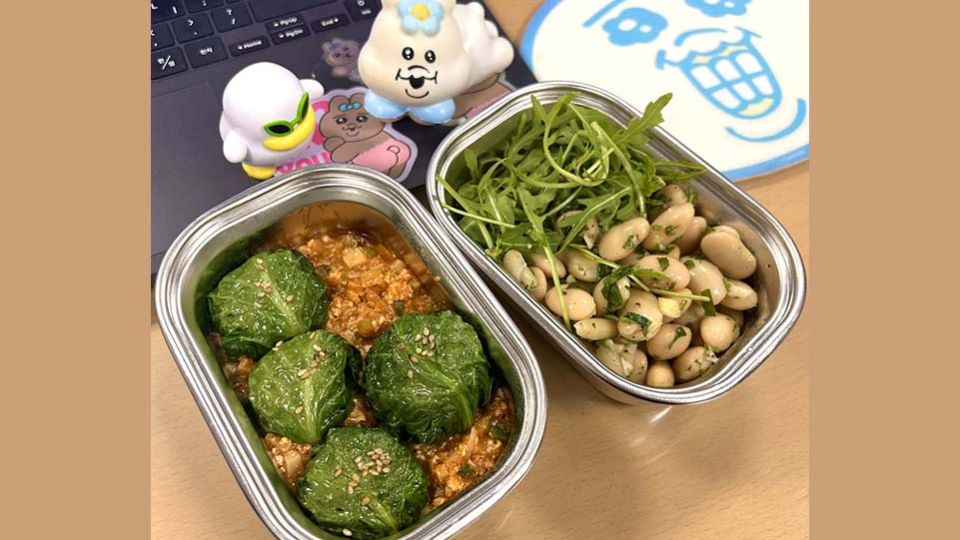March 24, 2025
SEOUL – Ha Sang-hee, a woman in her 30s, regularly shares photos of her homemade meals on social media platform X.
Her dishes consistently exclude white rice, processed foods and strongly flavored sauces— a choice she refers to as the “slow-aging diet.” To fully enjoy meals without these ingredients, she experiments with recipes and shares her successful creations online.
“(After eight months on the diet,) I feel my stamina and immunity have improved, and I am taking better care of myself. This has helped stabilize my mind and shake off negative thoughts,” Ha said.
She is not alone. Many others follow the same diet.
Some 58,000 participants, including Ha, share their slow-aging diet experiences in a group on X. Like Ha, many members are in their 20s and 30s.
The buzzword “slow aging” refers to a lifestyle focused on extending lifespans through good habits while minimizing physical and mental stress.
As a key part of this concept, the slow-aging diet emphasizes avoiding high-fat and high-glycemic ingredients, which can stress the body.
The term has recently gained widespread popularity in Korea, evolving from a social media trend among young users into a broader generational movement.
From meme to mainstream
During the early 2020s, many Korean consumers embraced bold flavors in foods like tteokbokki and malatang, believing these dishes helped relieve stress. However, a drastic shift occurred after the continued efforts of Dr. Jung Hee-won, a geriatric medicine professor at Asan Medical Center in Seoul and the leader of the slow-aging group that Ha is part of.
Since 2024, Dr. Jung has actively promoted healthy lifestyle choices on social media, particularly on X. His online influence turned “slow aging” into a viral meme, earning him the nickname “Professor Slow-Aging,” which has become more widely recognized than his real name.
Initially, he gained attention for unconventional food combinations, such as adding lentils and ice to ramyeon while discarding the soup. However, his continued advocacy has encouraged more people to adopt his dietary approach.
As the slow-aging diet gains momentum beyond social media, major food companies are jumping on board.
7-Eleven Korea and leading food manufacturer CJ CheilJedang have launched slow-aging-inspired products based on Dr. Jung’s recipes. These products feature mixed or whole grains, reduced salt and a higher proportion of vegetables.
“We found that lunchboxes and ready-to-eat meals created in collaboration with Professor Jung continue to be widely mentioned online. Most reviews come from millennials and Generation Z, spanning from teenagers to adults in their early 40s,” said an official from Korea Seven (operator of 7-Eleven Korea). The official added that these products remain among the top-ranked items on the franchise’s mobile app, even months after launch.
Meanwhile, GS25, another major convenience store chain, launched semi-polished rice in February, following a 60.7 percent year-on-year increase in mixed grain sales the previous month.
“Food lineups are now diversifying to cater to consumers drawn to the slow-aging trend. These new products can attract more buyers and further expand the health-focused food market,” said Lee Eun-hee, a consumer science professor at Inha University.
More popular among younger generations
One notable aspect of the slow-aging trend is its strong appeal to younger generations, who have focused less on healthy eating than older adults. In the past, Korean food trends favored creamy and sweet desserts, but this is changing.
This change is partly attributed to Dr. Jung’s active presence on social media, as well as endorsements from influential YouTubers and celebrities who have introduced the trend to younger audiences.
However, surveys indicate a general trend of people in their 20s and 30s placing a greater emphasis on health.
According to a market researcher Embrain Trendmonitor, the proportion of respondents in their 20s and 30s who reported making efforts to maintain their health increased to 55 percent and 49.5 percent, respectively, in 2024, up from 30.8 percent and 32 percent in 2016.
Notably, these age groups now show the highest interest in health management after those in their 60s, compared to having the least interest in 2016.
Various analyses explore the younger generations’ growing health consciousness.
The food industry points to an increased societal focus on health following the COVID-19 pandemic as a reason for growing health awareness. Additionally, some suggest that the sharp rise in obesity and diabetes cases among individuals in their 20s has contributed to this shift.
According to Choi Chul, a consumer economics professor at Sookmyung Women’s University, the slow-aging movement aligns with Korea’s evolving consumer behavior.
“As their average income rises, Koreans seek more than just enjoyment from consumption. Motivated by self-care and self-love, they find greater satisfaction in spending on health, which goes beyond achieving a good-looking body,” Choi said.
He added that this “self-love” mindset is particularly strong among younger generations, and social media has played a crucial role in spreading the trend.
“The rise of health-conscious content on social media, combined with the growing self-care movement, has likely accelerated the spread of health trends among younger Koreans,” he added.


